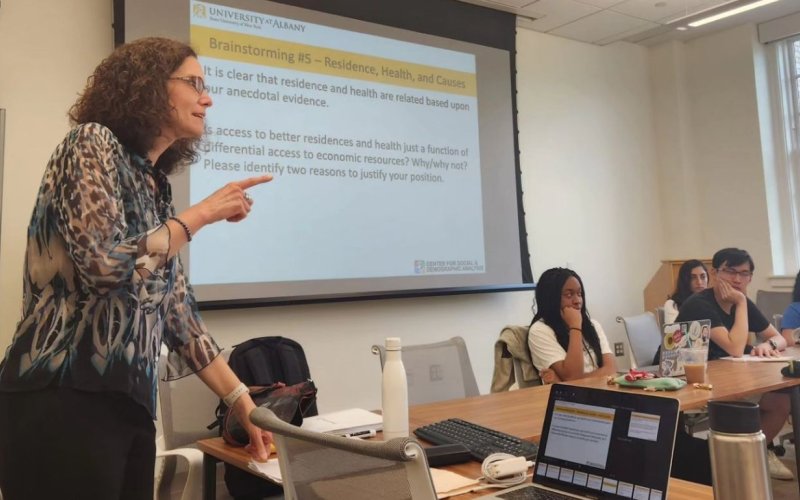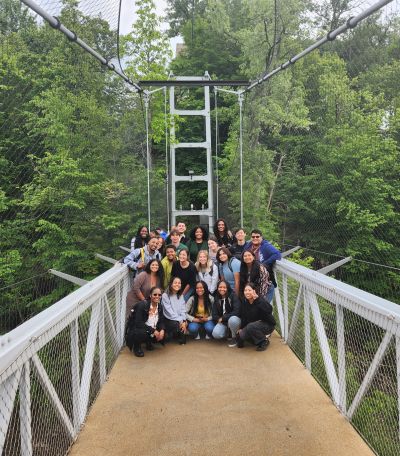NextGenPop Works To Expand the Fields of Demography and Population Science

ALBANY, N.Y. (Dec. 5, 2023) — Alyssa Kamara is an economics and public health major, interested in epidemiology set to graduate this May. The summer before her junior year, she took a detour into the field of demography, attending the inaugural NextGenPop program at the University of Wisconsin.
It was an experience Kamara described as formative, and it solidified her plans to pursue a graduate degree in public health.
Kamara was one of just 18 students selected to participate in NextGenPop, a National Institutes of Health-funded program aimed at increasing diversity in the field of demography and “nurturing the next generation of population scientists.” Undergraduate students from across the country gather for an intensive two-week program on population composition and changes, focusing on issues including race and income inequalities, health disparities and immigration.
“As a first-generation college student pursuing higher education, such in-depth exposure to all the options within social sciences really opened my eyes to a world of possibilities to pursue this kind of career,” she said. “I’m interested in studying health disparities and understanding the structural underlying of where that comes from, in the context of space and place and environmental exposures.”
Those themes are central to the field of demography, said Samantha Friedman, professor of sociology and director of the Center for Social and Demographic Analysis (CSDA), housed at UAlbany. CSDA is one of the consortium population centers that are participating in the NIH-funded NextGenPop programs. CSDA worked closely with faculty at Cornell who led the 2023 NextGenPop program.
Demographics is a field that looks at issues and events through one of three lenses: mortality, fertility and migration, Friedman said. So a climate crisis or natural disaster might be viewed in terms of deaths or how the event forces people to move from the area. Inequities in housing or health might be viewed in terms of all three. In studying epidemiology or health disparities, demographers might be looking at mortality, morbidity or quality of life issues, she said.
“I think what demographers do particularly well is look more at the social and spatial context, and the ‘social’ really gets at the structural inequalities,” explained Friedman, whose research focuses on housing disparities and who led a workshop at the second NextGenPop program last month at Cornell University. “I think they do that well because they try to look at the historical and unequal processes that caused these disparities.”
Kamara learned something about how demographers work at NextGenPop, including where to gather data and how to put it into context. “We talked not only about data visualization but also where demographers get their data,” she said. “We talked a lot about the census, including racial categories and the whole topic of critical demography, where you’re questioning what these categorizations actually mean and whether they are reflective of who you’re trying to categorize.”
She and three other colleagues from the first NextGenPop spent a few days at the second annual program at Cornell. “We just want to stay connected with the all the cohorts that come after us and kind of create a larger network of NextGenPoppers," she said.
Friedman’s workshop at Cornell was on historical redlining, residential segregation and health, and how connections between the three can be seen through examining and measuring data. She also facilitated a career panel focused on jobs in public health and health policy, which included research scientists of color from the New York State Department of Health, one of whom is an adjunct faculty member at UAlbany.
Kamara said the career panels at her program were informative and added that she also learned a lot from her peers, who came from different majors and backgrounds. “I was one of three public health students. There were a lot of sociology or economics majors, but there were also some who were interested in criminal justice and planning,” she said. “I thought just learning about their experiences, the things they were learning and discussing, and also the way that they approached applying to masters and PhD programs and med school — and the reasons why they decided to pursue their respective paths — was also very insightful for me.”
NextGenPop students are invited to attend the annual meeting of the Population Association of America, and are paired with a mentor familiar with their field. Friedman and Kamara both attended the 2023 meeting in April in New Orleans, and Friedman said the mentoring and networking were a bonus for the NextGenPop students.
In 2024, the NextGenPop program will take place at Duke University. Applications are open now for students who are currently sophomores and juniors. For more information and to apply visit nextgenpop.org or contact Friedman at [email protected].





